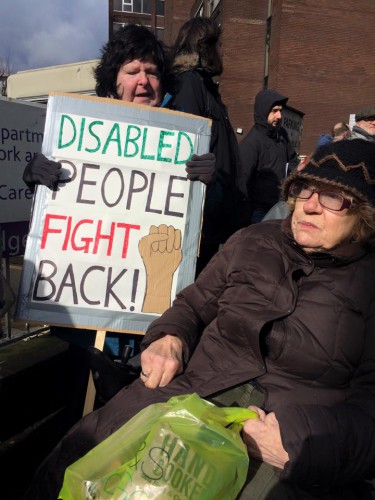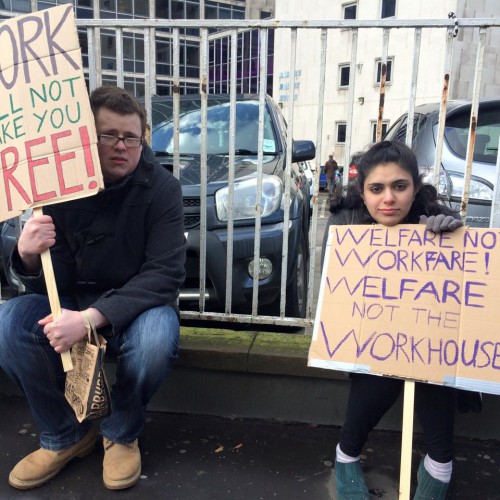Disabled People Against Cuts launch local group
Article published: Thursday, March 19th 2015
A new branch of Disabled People Against Cuts will be launching this week in Manchester. The activist group are holding their first meeting on Thursday 19th March at Manchester Deaf Centre to kickstart a campaign against the government’s welfare reforms and the Work Capability Assessment (WCA).
 The group held a demonstration on Monday 2nd March against Maximus, the company taking over from Atos to carry out the WCA for sick and disabled benefit claimants. Timed to coincide with the first business day of the US company’s £500m contract, the demonstration came as part of a national day of action organised by Disabled People Against Cuts (DPAC) as disabled rights activists called for the WCA to be scrapped.
The group held a demonstration on Monday 2nd March against Maximus, the company taking over from Atos to carry out the WCA for sick and disabled benefit claimants. Timed to coincide with the first business day of the US company’s £500m contract, the demonstration came as part of a national day of action organised by Disabled People Against Cuts (DPAC) as disabled rights activists called for the WCA to be scrapped.
The computer-based test used by the Department for Work and Pensions (DWP) to determine whether people claiming Employment and Support Allowance (ESA) are ‘fit for work’ has been widely criticised for being inhumane, ineffective and ideologically driven.
“The assessments are degrading and humiliating”, said Dennis Queen, a DPAC activist demonstrating outside Maximus’ Manchester office at Albert Bridge House. “They ask us to perform tasks that have no relevance to work and use the results of those tasks to assess whether or not we’re capable of working.”
The programme became notorious under Atos as increasing numbers of ESA claimants, many seriously ill and incapacitated, were being told that they were well enough to work and having their benefit payments stopped.
Criticism of the system intensified as a growing number of claimants died after being declared fit for work. While the DWP has carried out internal investigations into 60 deaths thought to be related to their welfare reforms, disabled activists are certain that the actual figure is much higher. Hermann, another DPAC member at the demonstration, said that the number has now reached the tens of thousands: “It’s appalling, the human damage being done.”
Disability rights campaigners argue that the distressing assessment process is causing the condition of claimants to deteriorate and even pushing many to suicide. Rick, an activist speaking to the crowd of demonstrators, stressed the emotional strain and grave consequences of the assessment programme: “We have a government that is quite happy to cause death to realise its policies, and that is unacceptable in a democracy.”
As well as the suffering caused by the assessments, activists are also challenging the efficacy of the system. Pointing to the lack of employment opportunities for disabled people, Dennis argues that the DWP’s policy is failing, even on its own terms: “You can keep assessing people and cutting their benefits, but it doesn’t mean that there’s a job out there for them to go to.” According to New Approach, a campaign working to abolish the WCA and replace it with a more adaptable and humane system, of the 4.8 million assessments carried out since the ESA programme was initiated, “just over 26,000 claimants have ended up with a job outcome”, a success rate of only 0.5%.
In fact, Dennis explains, with services such as Access to Work and the Disability Living Allowance being cut, the government are dismantling the services that previously supported disabled people in finding and keeping employment. “They’re penalising the wrong people,” she said. Rather than encouraging employers to “open up the workplace” to the disabled, the government are punishing the jobless.
This contradiction lies at the heart of the struggle against the WCA. For disabled rights activists, it demonstrates that the DWP’s assessment programme is not really designed to help the sick and disabled back into work but is instead an ideological attack on some of the most vulnerable members of society, conducted for private profit. “This isn’t about whether people have the capacity to work,” says Dennis, “this is about simply doing some assessments in order to cut people off benefits and give that money to a big corporation.”
The activists see the WCA as the result of a wider government campaign to demonise the disabled. While the DWP justify their punitive policy as being part of a clampdown on cheats and “scroungers”, so Rick, the actual rate of benefit fraud is only 0.7%. “It’s not systemically significant,” he said, “but we have all been smeared as criminals. We’re treated as fraudsters until proven innocent.”
While the DWP and Maximus claim that the new contract will bring a different approach to the programme, DPAC are clear that substituting the company in charge is simply an act of rebranding and will do nothing to address the fundamental injustice of the system. Campaigners in Manchester hold up Maximus’ track record as a clear indicator that nothing will improve: the company have been involved in a number of alleged incidences of fraud in the US, as well as an instance in which they were forced to pay $50,000 to settle a disability discrimination lawsuit.
Asked how their approach would differ from Atos’ and whether their obligation to implement the government’s welfare reforms would force them to add to the suffering already caused by the WCA, a Maximus spokesperson said: “There are many challenges that will take time to overcome, but we believe that we have the clinical expertise and fresh approach that, over time, will reduce waiting times, improve the quality of the service and deliver a better service for the people we assess.”
After a successful campaign forced Atos to abandon their contract with the DWP early, activists are planning to wage a similar war on Maximus with the hope of forcing the company out and, ultimately, abolishing the WCA altogether.
Campaigners at New Approach have drawn up a proposal for a replacement system which would use a more flexible assessment process, taking into account the employability of the claimant, the view of the claimant’s own GP as well as an independent health care professional and, crucially, the claimant’s own self-assessment.
For the demonstrators outside Albert Bridge House, what is needed most is a fundamental shift in the way society views work, welfare and the disabled. “We have to accept that some disabled people will not have traditional employment,” said Dennis. For her, the social security system should be geared towards supporting those in need, instead of chasing people back into work. “These systems are here so that every person who is working, if they become incapable of work, will not be left to rot in the street”, she said, “will not be left homeless and hungry, and will not end up so depressed that they commit suicide.”
Michael Crick
Manchester Disabled People Against Cuts will hold their launch meeting at 5:30pm on Thursday 19th March at Manchester Deaf Centre, Crawford House, Booth Street East, M13 9GH.
If you want to get involved, more information about DPAC can be found at dpac.uk.net. More information about New Approach can be found at newapproachuk.org
More: Cuts, Manchester, News, QuickKick, Welfare
Comments
No comments found
The comments are closed.



